Session Five - The Gospel According to Mark
Author
The title "According to Mark" is found in the earliest manuscripts.
Who was Mark? Believed to be the same Mark who was the cousin of Barnabas (Col 4:10) and the son of the Mary who provided a meeting place for early Christians (Acts 12:12).
John Mark accompanied Barnabas and Saul on the first missionary journey (Acts 12:25; 13:5), but departed early for Jerusalem (Acts 13:13). After the Jerusalem Council (Acts 15), Barnabas and Paul were planning on making their second journey. Barnabas wanted to take John Mark, but Paul opposed the idea because Mark had separated from them on the first Journey. Consequently, Barnabas took John Mark, and Paul took Silas and the two groups went their separate ways (Acts 15:36-41). After Barnabas gave his cousin a second chance, Paul was later able to call him a co-worker (Philem 24; cf. Col 4:10) who was helpful to his ministry (2 Tim 4:11). It is also evident that Mark shared a special relationship with Peter. Not only does Peter call him his "son" (1 Pet 5:13), but they had both experienced failure and restoration.
Date of Composition
Biblical scholars believe that Mark's Gospel was the first to be composed, around the late 50s-early 60s, the earliest of the Gospel accounts.
Location, Purpose and Audience
There is considerable agreement (from the time of the church fathers) that Mark composed his Gospel in Rome. His expressed intention was to compose "the gospel of Jesus Christ, the Son of God". He may have written his account to encourage the Christians in Rome under persecution instigated by Nero.
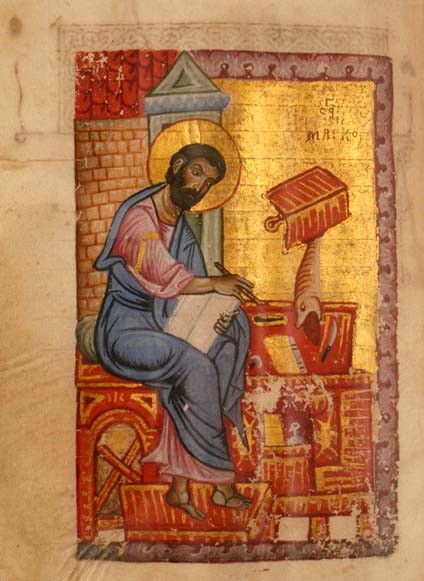
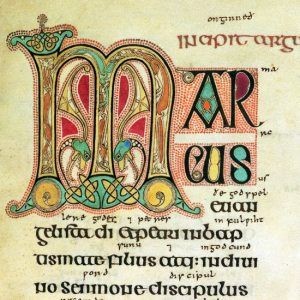
Mark - a good account to give someone interested in Christianity or starting the Christian life.
Key Personalities
Jesus Christ, His Twelve Disciples, Jewish religious leaders, Pilate, and John the Baptist.
Themes and Theology
Each gospel account gives us a portrait of Jesus, his mission and teaching. Each is different in style, length, and emphasis. But they all have a common thread and purpose - the proclamation of the good news of Jesus Christ.
Mark's theme focuses on the person of Jesus Christ as Son of God, and Servant (10:44-45).
Among the four gospels, Mark's narrative is unique in many ways. It is full of facts, the shortest account, and seems to be the earliest. Both Luke and Matthew use much of Mark's text. Luke's account contains over half of the verses in Mark's account. Unlike Luke and Matthew who begin their accounts with the events surrounding the birth of the Messiah, Mark skips the birth and childhood of Jesus and launches straight into his account with Jesus' public ministry and the mission of John the Baptist; Mark (who is not writing a biography) leaves no doubt as to who Jesus was.
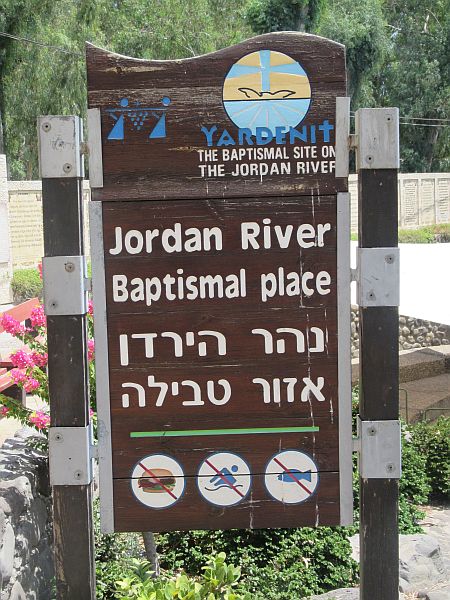
A typical day for Jesus is outlined in 1:21-34.
Consider the pace of Jesus' ministry as outlined in the following:
"The apostles returned to Jesus from their ministry tour and told him all they had done and taught. Then Jesus said, 'Let's go off by ourselves to a quiet place and rest awhile'. He said this because there were so many people coming and going that Jesus and his apostles didn't even have time to eat. So they left by boat for a quiet place, where they could be alone. But many people recognized them and saw them leaving, and people from many towns ran ahead along the shore and got there ahead of them. Jesus saw the huge crowd as he stepped from the boat, and he had compassion on them because they were like sheep without a shepherd. So he began teaching them many things." (6:30-34)
Unlike the other Gospel writers, especially Matthew, Mark's quotes from the Old Testament sparingly, eg at the very beginning, referring to John the Baptist's role in the coming of the Messiah (1:2, 3) and in the words of Jesus, citing the Psalmist (12:9-11) and Isaiah (4:12).
Mark displays both Jesus' divinity and his humanity. For example, (only) Mark tells us that Jesus is "the carpenter" (Mk 6:3). Also, "Isn't this Mary's son and the brother of James, Joseph, Judas and Simon? Aren't his sisters here with us?" (6:3). Jesus humanity, and the sense that they knew him all too well, led to people in His home town rejecting Him.
In the very first sentence of his account Mark proclaims that Jesus is the "Christ, the Son of God" (Mark 1:1). This is attested by the Father at the time of Jesus' baptism (1:11) Jesus was not simply a man among men, a charismatic religious leader at a time of great turmoil, but one who caused great wonder, amazement, and awe in those who encountered him. "They were astonished at his teaching" (Mk 1:22); "they were all amazed" (Mk 1:27); "they were utterly astounded" (Mk 6:51); "the disciples were amazed at his words" (Mk 10:24), etc.
"Jesus went from village to village, teaching the people." (6:6). Mark stresses Jesus as "Teacher" and as the "Servant of God". Jesus is regularly addressed as "Teacher" by his disciples (Mk 4:38) and by those who seek his help (Mk 5:35). Mark also uses the Hebrew form of teacher, "Rabbi" (Mk 9:5). Ironically he gives little of Jesus' actual teaching, compared with Matthew, Luke and John; instead, he stresses what Jesus did. Mark is an action-packed Gospel; it depicts Jesus' ceaseless activity and his power over sickness, disease, death, and the work of evil spirits. Mark wrote a story, not a theology. He emphasizes action, as seen in the frequent appearance of the Greek word euthys ("immediately, right away, at once, as soon as"), used 42 times, more than the rest of the New Testament books combined.
"...there were many who followed him" (2:15)
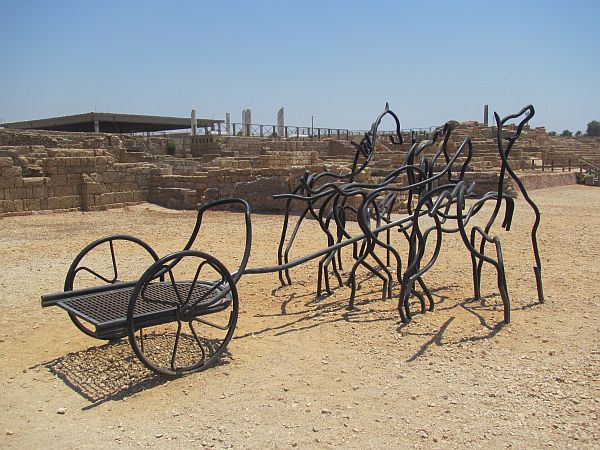
Caesarea Maritima
One of the most predominant themes in Mark is the Messianic revelation. Jesus does not reveal, or admit to, his Messiahship in the first half of Mark. In the second half he acknowledges it to the disciples after Peter's confession, but commands them not to tell anyone (8:27-30). Demons realized who He was, but even they were commanded to stay silent (1:34; 3:12). Some who were healed by Jesus also knew who he was, yet they too were commanded to keep it to themselves (1:43-45). The identity of Jesus as Messiah (in this Gospel account) reached its climax at the confession of the centurion who said that Jesus truly was the Son of God (15:39).
Mark also focused on the kingdom of God and discipleship. His theology of the kingdom is, however, less developed and less integral than that of Matthew's or Luke's. He is clear about the personal cost of discipleship (10:17-31, the encounter with a rich young ruler and 8:34-38, "Take up your cross and follow me").
Mark did not conceal the human failures of the disciples. Like many followers of Jesus, they initially had a hard time understanding many of His' teachings (4:13; 7:18; 9:10, 32; 10:10). Mark is quick to show the shortcomings of Peter. Mark reveals Jesus' rebuke of Peter (8:32-33), and then illustrates the depths of Peter's failure and denial of Christ (14:27-31, 66-72).
Literary Style and Structure
Mark's account of the Gospel is in the form of a story, like a newspaper.
There is not much consensus on how to divide up the Gospel.
- The first thirteen verses designate the beginnings of Jesus' ministry.
- Following that are John the Baptist's declaration, Jesus' baptism, the descent of the Holy Spirit on Him, his first temptation, callings of the disciples and His' ministry in Galilee.
- In Capernaum the scribes and Pharisees raise objections. Jesus is misunderstood by friends and family.
- Mark recounts a number of parables.
- Half of the Gospel consists of accounts of miracles.
- Jesus goes to Caesarea Philippi, after which he makes his way up to Jerusalem where the passion takes place.
- The story ends with the resurrection of Christ.
- Peter's confession in 8:27-30 constitutes a turning point in Mark, because this is the first recognition of who Jesus is within the Gospel. After this point, Jesus emphasizes things that pertain to his Messiahship, such as rejection, suffering, death and resurrection.
There are also differences of opinions about the ending (16:9-20). Some manuscripts finish at 16:8. The longer version is the one considered canonical.
Mark sees Jesus' miracles as evidence of His identity (4:41; 5:7; 19, 20); demonstration of His power (4:39; 5:30) and foreshadowing of His gift of eternal life (5:23, 42).
Miracles in Mark
In the New Testament these four Greek words are principally used to designate miracles:
- Semeion, a "sign", ie an evidence of a divine commission; an attestation of a divine message
- Terata, "wonders" ...
- Dunameis, "might works" works of superhuman power
- Erga, "works"
There are at least 24 accounts of the supernatural (some miracles are likely to have been multiples) of Jesus recorded in the Gospel according to Mark, who gives more relative space to the miraculous aspects of Jesus' ministry than do the other Gospel accounts.
| | Miracle | Demonstrated
Jesus' Power Over |
|---|
| 1. | The man with an unclean spirit (1:23-26) | spirit world |
| 2. | Healing Simon's mother-in-law (1:30-31) | disease |
| 3. | Healed and cast out demons (1:33, 34) | disease, spirit world |
| 4. | Driving our demons (1:39) | spirit world |
| 5. | Healing a leper (1:40-45) | disease |
| 6. | Healing palsy (2:1-12) | disease |
| 7. | Healing a withered hand (3:1-6) | disease |
| 8. | Healed and cast out demons (3:10-12) | disease, spirit world |
| 9. | Stilling the storm (4:35-41) | nature |
| 10. | The Gadarene demoniac (5:1-20) | spirit world |
| 11. | The daughter of Jairus (5:21-43) | death |
| 12. | The afflicted woman (5:25-34) | disease |
| 13. | Healing of a few sick people in Nazareth (6:5) | disease |
| 14. | Feeding the five thousand (6:30-46, the only miracle common to all four Gospels) | nature |
| 15. | Jesus walking on the water (6:47-56) | nature |
| 16. | Syro-Phoenician woman's daughter (7:24-30) | spirit world |
| 17. | Deaf and mute man (7:31-37) | disease |
| 18. | Feeding the four thousand (8:1-9) | nature |
| 19. | The blind man near Bethsaida (8:22-26, only in Mark) | disease |
| 20. | Transfiguration & appearance of Moses/Elijah (9:24) | natural world |
| 21. | The demoniac boy (9:14-29) | spirit world |
| 22. | The blind man near Jericho (10:46-52) | disease |
| 23. | The withered fig tree (11:20-25) | nature |
| 24. | Resurrection (16:11-14) | death |
The miracles of Jesus demonstrated his divine authority (including authority to forgive sin, 2:10, 11) and power over disease, nature, the spirit world, material things and death; they are almost always in response to human needs. They proved that he was from God. Most people in Jesus' home town refused to recognize His miracles, but elsewhere they flocked to Him. The disciples were given authority to cast out demons and heal the sick for a season (6:12).
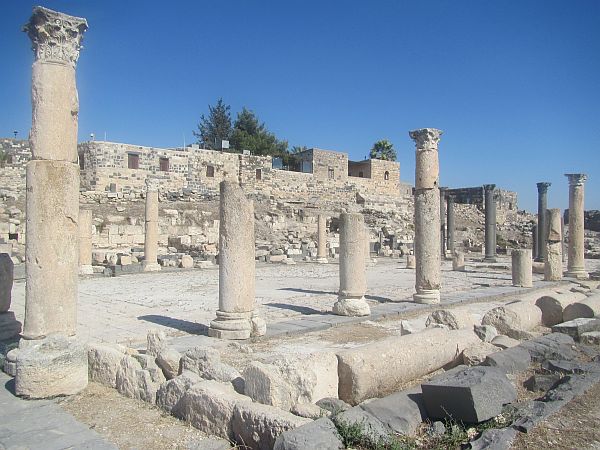
Ruins of Gadara, in Jordan (Mark 5)
Parables of Jesus recorded in Mark
- The parable of the sower - 4:1-20
- The parable of the seed growing secretly - 4:26-29 [unique to Mark]
- The parable of the mustard seed - 4:30-32
- The parable of the tenants - 12:1-11
- The parable of the budding fig tree - 13:28-32
- The parable of the faithful servant - 13:33-37
Controversies in Mark
"Why don't your disciples follow our age-old tradition? (7:5). Clashes between Jesus and the dogmas of the religious leaders were inevitable.
Jesus told them, "... you ignore God's law and substitute your own tradition... You skilfully sidestep God's law in order to hold on to your own tradition... you cancel the word of God in order to hand down your own tradition".
This would lead to His death. What did Jesus do wrong, in their eyes?
- Forgave "sinners" (the irreligious) - 2:1-12
- Ate with sinners - 2:13-17
- Did not fast according to established conventions - 2:18-22
- Picked grain on the Sabbath - 2:23-28
- Healed a man with a withered Hand - 3:1-6
- Cast out demons- they assumed he was in partnership with Beelzebul - 3:20-28
- Ate with ritually "unclean" hands - 7:1-23
- Differed with them over divorce - 10:1-12
- Differed with them over authority - 11:27-33
- Differed with them over payment of taxes to the secular authorities - 12:13-17

The Passion in Mark
- Peter, James & John fall asleep while Jesus prays in Gethsemane (14:32-42).
- Jesus accepts his suffering as the will of God (14:36).
- Judas betrays him (14:43-45).
- the disciples forsake him and run away from the arresting soldiers (14:50).
- a young man "leaves all" to escape arrest (14:51-52).
- Peter denies Jesus (14:66-72).
- Jewish leaders mock him as a false prophet (14:65).
- the crowd calls for him to be crucified (15:6-14).
- Jesus is sentenced to die because he claims to be God's Son (14:61-62; 15:29-32).
- Roman soldiers mock him as a false king (15:16-20).
- passers-by join Jewish leaders in mocking him on the cross (15:29-32).
- crucified criminals taunt him (15:32).
- darkness covers the land, and Jesus cries out, "My God, my God, why have you forsaken me?" (15:33-34).
- (ironically) his death inspires the first recognition of him as the Son of God (15:39).
- tearing of the heavens and of the temple curtain (1:10; 15:38) and identification as the Son of God (15:39).
- resurrection (16:9-14)
- Great Commission (16:15-18)
- ascent to heaven (16:19)
Mark's style was fashioned especially for its intended audience, the Romans. Therefore, absent from his record are the genealogies of Christ (of more interest to Jewish audiences), the early life of John the Baptist and Jesus (the first 30 years), and he only twice quotes from the Old Testament. Mark relied more on testimony than the fulfillment of prophecy; he appealed to the body of evidence that was the most likely to persuade the hearers of his message concerning Christ and his kingdom.

By the Dead Sea.
Contemporary society mirrors the Roman world in many ways. The Gospel according to Mark demonstrates that we can have a confident faith in Jesus Christ as Saviour.
For Reflection:
- What does the life of John the Baptist tell us about doing God's will?
- Read the parables; what is God saying about your Christian walk? Write it down.
- Can you believe that Jesus as portrayed by Mark can work God's power in your life?
- Do you ever feel, "I do believe; help me overcome my unbelief"? What then?
- Do you focus on keeping God's commandments externally or living in grace?
- Life is as fast-paced as Mark's Gospel depicts. Where does Jesus fit into your life?
- Jesus emphasised serving (not controlling) others as central to Christian ministry.
- Jesus is shown as a man of prayer - how can He be an example to you?






